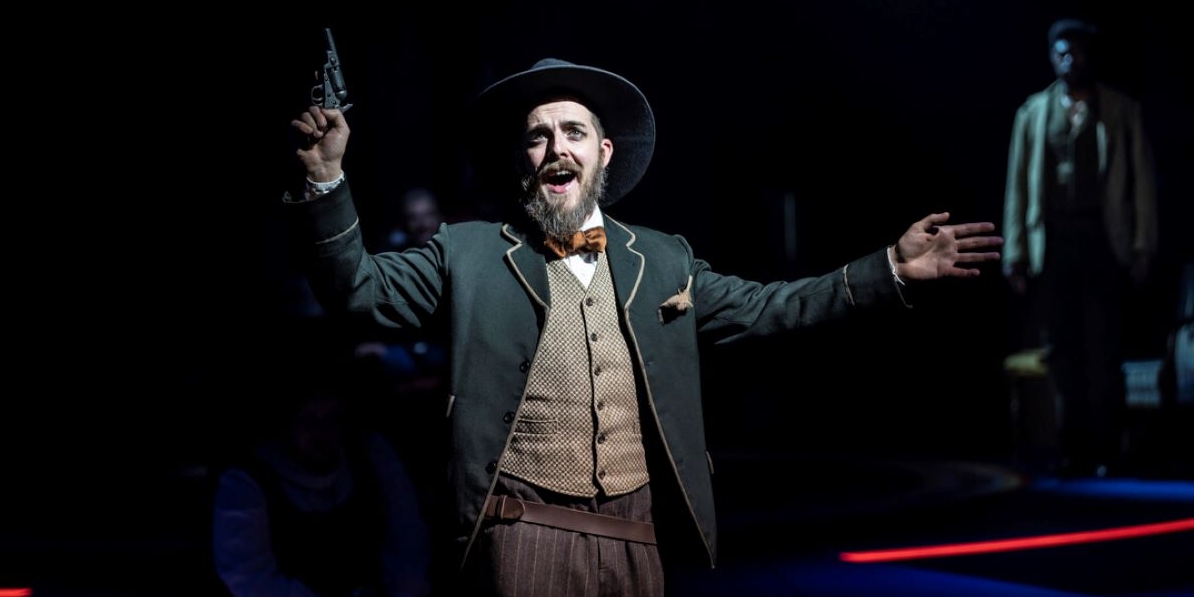Fresh from reviewing ‘Gypsy, to which Sondheim contributed the lyrics, and then coming to ‘Assassins’, it is astonishing to see the creative distance the composer travelled between 1959 and 1990, and the transformation in the American musical achieved in those decades, much of it thanks to his determination to locate music solely within a compelling and specific dramatic context. Instead of showpiece numbers, easily detachable from the show, we have in ‘Assassins’ a consistently uncomfortable, serious-minded concept show rather than a simple songfest. The case studies of nine of the individuals who have shot and on occasion killed American presidents offer a series of contrasted character portraits, but also an analysis of the American Dream gone sour.
In a long scene devoted to Lee Harvey Oswald it is suggested that there is a narrow line in American life between the disappointment represented by the wan failure and suicide of Willy Loman in ‘Death of A Salesman’ and deciding to shoot the president. In both cases there is a desire to assert that ‘attention must be paid.’ The serious and the satirical elements of this show are best interpreted through this lens.
Lizzie Clachan’s design locates the action in the full razzamatazz of a political convention – the set is decked out in red, white and blue and focuses on a podium lecturn and curtain which later on reveal a mock-up of the Oval Office beyond. A walkway thrusts out into the auditorium and the band are in a recessed pit at the front of the stage. An electric chair, a gibbet and other paraphernalia of execution emerge and then return below the stage. There is a lot of flexibility for individual movement and choreographed group action, which develops through the evening in a lucid flow avoiding the potential flaw of fragmentation. This is evident right from the start as cheer-leaders get the audience going with a mexican wave alongside feel-good standards belted out through the sound system.
Limitations of space prevent detailed analysis of all the portrayals on offer here, but suffice to say that each character makes a powerful impression and there are no weak links. Danny Mac stands out as John Wilkes Booth, not only for the forceful portrayal of his own ballad, hinting at thespian vanity as much as principle in his motivations, but also for his coordinating role among the group as a whole. Harry Hepple, as the seriously unbalanced Charles Guiteau finds a manic camp intensity that is a wonderful comic match to the waltz theme Sondheim gives him; and Amy Booth-Steel regularly steals the show as the hapless Sarah Jane Moore, as chaotic as a wannabe assassin as she was in the rest of her life.
It was a deft idea to divide the role of the Balladeer, who provides much of the linking material, into three, allocated between different political commentators and set against a backcloth of video material that might be from CNN or Fox News. At a stroke the action is updated from the 1990s to the present day with full plausibility, melding the worlds of entertainment, celbrity and politics in a way that the show eerily anticipates.
There are some tart and delicious sonorities in the band, registering the panoply of references in the music to elements of American musical traditions, whether Sousa marches, folk songs from down South, soft-core pop, barbershop harmonies, and the more high-brow vision of Aaron Copland, all tightly held together by musical director Jo Cichonska. But there are regular Sondheim trademarks too: the opening number, ‘Everyone has the right’, coordinated by Peter Forbes as the impresario, is in that double-edged jaunty vein he initiated with ‘Comedy Tonight’, and ‘Something Just Broke’ is the one straightforwardly plangent number, an exquisite evocation of the world-wide impact of the Kennedy assassination.
It is worth stressing that there is a lot of acting to do here too. In some of John Weidman’s scenarios there is more talk than music or action, and especially in the case of Samuel Byck whose meandering, borderline sane, monologue about the disappointments of his life and his determination to fly a plane into Nixon’s White House could easily go off the rails. It is a tribute to the skills of Nick Holder that this scene remains utterly compelling and was heard on press night in rapt attention.
This will never be a regular crowd-pleaser of a show. But that is not Sondheim’s purpose. He sets himself a much harder and ambitious target – the unveiling through both empathy and satire of a whole slice of American social history. This production realises that vision impeccably.

